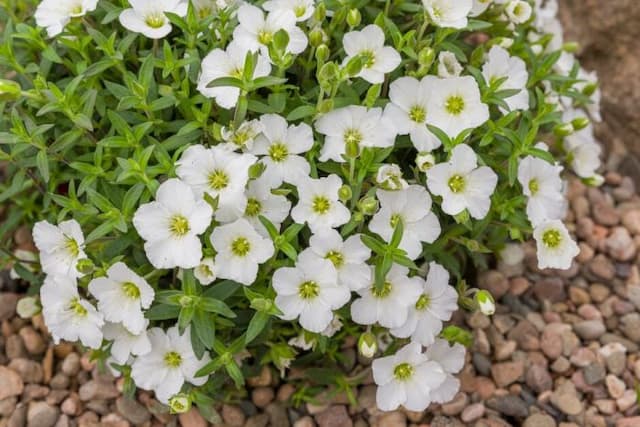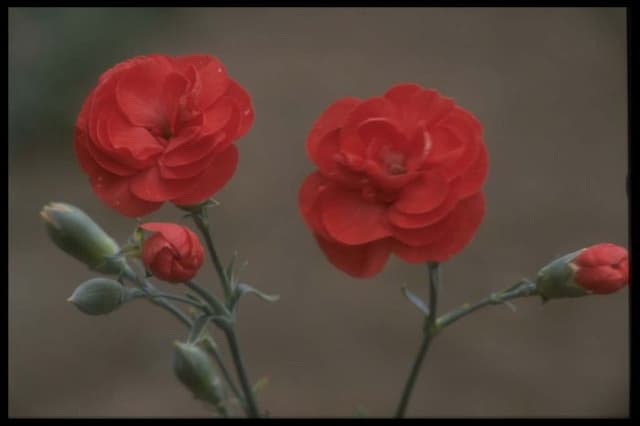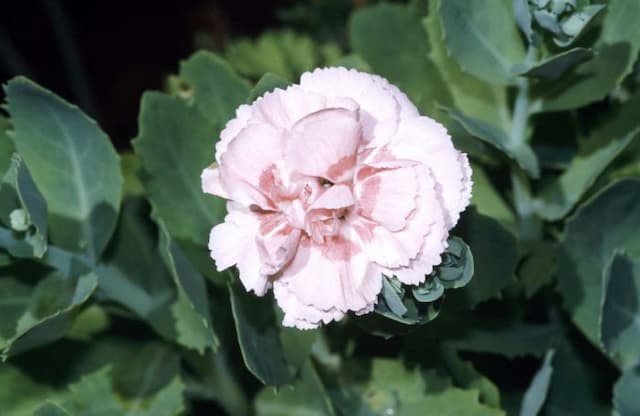Pink Dianthus 'Leuchtkugel' (p)

ABOUT
Dianthus 'Leuchtkugel,' commonly known as Cheddar Pinks or just Pinks, is a vibrant and showy perennial that adds a splash of color to any garden. The plant is adorned with a profusion of flowers that are strikingly rich in color. These flowers are characterized by their bright pink hue, which is why the plant is commonly referred to as Pinks, despite the fact that their shade can sometimes lean into a magenta tone. The petals are often slightly ruffled and can have a frilly appearance, adding to the overall texture of the blossoms. The flowers of Cheddar Pinks are distinctive not only for their color but also for their patterned petals, which may feature a contrasting ring or eye in the center, giving each bloom its own unique character. They emit a spicy, clove-like fragrance, which is quite appealing and contributes to their popularity in gardens and floral arrangements. The foliage of Dianthus 'Leuchtkugel' is also notable. The leaves are slender, with a blue-green color, and form a neat, compact mound that provides a beautiful contrast to the bright flowers. This lush cushion of foliage serves as an attractive backdrop to the blossoms, highlighting their color and form even when the plant is not in bloom. Cheddar Pinks have a long flowering season that extends through much of the spring and summer, allowing gardeners to enjoy their vivid display for an extended period. Their durability, along with the delightful scent and spectacular blossoms, makes this plant a cherished addition to borders, rock gardens, or as edging along paths and walkways.
About this plant
 Names
NamesFamily
Caryophyllaceae
Synonyms
Cheddar Pink, Sweet William, Garden Pink
Common names
Dianthus 'Leuchtkugel'
 Toxicity
ToxicityTo humans
The Dianthus 'Leuchtkugel', commonly known as Pinks, is not considered toxic to humans. However, as with any plant, individual sensitivities can vary and some people might experience mild gastrointestinal discomfort if ingested, or skin irritation from handling the plant.
To pets
Pinks are typically not poisonous to pets either. Should a pet ingest part of the plant, there is a low likelihood of serious poisoning. However, some pets may have a sensitivity to the plant which could result in mild vomiting or diarrhea. It's always best to monitor your pet and consult a veterinarian if any concerning symptoms arise after ingestion.
 Characteristics
CharacteristicsLife cycle
Perennials
Foliage type
Evergreen
Color of leaves
Blue-green
Flower color
Pink
Height
1 foot (30 cm)
Spread
1 foot (30 cm)
Plant type
Herb
Hardiness zones
3
Native area
Europe
Benefits
 General Benefits
General Benefits- Attractive Flowers: The Dianthus 'Leuchtkugel', commonly known as Pinks, produces bright, eye-catching flowers that add a splash of color to gardens and landscapes.
- Prolonged Bloom Time: Pinks have a long flowering season, typically from late spring to early autumn, providing continuous visual interest throughout the growing months.
- Low Maintenance: This plant is generally easy to care for, requiring minimal attention once established, making it ideal for gardeners of all skill levels.
- Drought Tolerance: Once established, Pinks are quite drought tolerant, making them suitable for water-conscious gardeners or regions with water restrictions.
- Attracts Pollinators: The fragrant flowers of Pinks attract bees, butterflies, and other beneficial pollinators, supporting local ecosystems.
- Compact Size: With a compact and neat growth habit, Dianthus 'Leuchtkugel' is perfect for borders, edging, and small garden spaces.
- Versatility: Pinks can be used in a variety of garden designs, including rockeries, containers, and as ground cover, providing flexibility in landscaping choices.
- Cold Hardy: The plant is cold hardy and can survive in cooler climates, making it a suitable choice for northern gardeners.
- Deer Resistance: Pinks are known to be deer resistant, which can be beneficial in areas where deer predation is a concern for gardeners.
- Fragrance: The flowers of Dianthus 'Leuchtkugel' emit a sweet, clove-like fragrance that can add an aromatic dimension to gardens and outdoor living spaces.
 Medical Properties
Medical PropertiesThis plant is not used for medical purposes.
 Air-purifying Qualities
Air-purifying QualitiesThis plant is not specifically known for air purifying qualities.
 Other Uses
Other Uses- Dianthus 'Leuchtkugel' can be used for cut flowers due to their vibrant colors and long vase life, providing a natural decorative element for home interiors.
- The petals of this carnation can be crystallized or candied for decorative use on desserts and cakes, contributing a subtle flavor and floral aesthetic.
- The blooms can be used in potpourri mixes because of their pleasant scent, adding natural fragrance to a room.
- Dried carnation petals can be used in homemade soaps and bath bombs, offering a touch of fragrance and gentle exfoliation properties.
- The flowers are useful in dye production, where the pigments can impart colors to fabrics and crafts.
- Carnation petals can serve as a natural confetti at weddings and celebrations, which is biodegradable and less harmful to the environment than synthetic alternatives.
- The plant can be incorporated into a sensory garden for its varied textures and fragrance, contributing to a therapeutic and immersive garden experience.
- Dianthus flowers can be pressed and included in personal diaries, invitations, or greeting cards for an artistic touch.
- The plant can be used as a natural insect deterrent in gardens when planted strategically amongst vegetable patches.
- Carnation plants can be used in educational settings to teach children about the growth and care of flowering plants through hands-on involvement.
Interesting Facts
 Feng Shui
Feng ShuiThe Carnation is not used in Feng Shui practice.
 Zodiac Sign Compitability
Zodiac Sign CompitabilityThe Carnation is not used in astrology practice.
 Plant Symbolism
Plant Symbolism- Love: The common name for Dianthus 'Leuchtkugel' is Pink. Pinks are often associated with love and affection, derived from the historic use of these flowers in bouquets and as a symbol of love in literature and art.
- Admiration: Pinks, like many other Dianthus varieties, represent admiration and are frequently given to express high esteem for an individual's qualities.
- Pure Affection: The delicate and simple beauty of the Pink is emblematic of pure affection, suggesting a love that is untainted by selfishness or ulterior motives.
- Boldness: Pinks can also symbolize boldness due to their bright and striking colors, which stand out in the garden and can signify a daring or brave sentiment.
 Water
WaterPinks need to be watered regularly, but they do not do well with excessive moisture, so it's crucial to allow the soil to dry out slightly between waterings. A good rule of thumb is to water them once or twice a week, providing about one inch of water each time which is roughly 0.62 gallons for an area of 10 square feet. During hot, dry spells, you may need to water more frequently to prevent the soil from drying out completely. Always check the top inch of soil for dryness before watering. Overwatering can be detrimental to pinks, so it's important to ensure good drainage and never let them sit in waterlogged soil.
 Light
LightPinks thrive in full sun conditions, meaning they should receive at least 6 to 8 hours of direct sunlight daily. They will perform best when placed in a location where they receive morning light, which is less intense, and protection from the harsh afternoon sun, although they can tolerate it if acclimated. Choose a spot in your garden that is sunny with some afternoon shade for the best flower production and health of your pinks.
 Temperature
TemperaturePinks are quite hardy and can tolerate a range of temperatures but generally prefer cooler conditions. They can survive winters with temperatures as low as 20°F and summers with high temperatures around 85°F. Ideally, keep your pinks in an environment where the temperature is consistently between 60°F and 75°F for optimal growth and flowering.
 Pruning
PruningPruning pinks is important to encourage bushier growth and more flowers. Deadhead spent flowers regularly to prolong the bloom period. Cut back about a third of the growth after flowering has ceased to rejuvenate the plant and encourage a second flush of blooms, usually in late summer or early fall. Avoid pruning in late fall or winter, as this can reduce the plant's cold hardiness.
 Cleaning
CleaningAs needed
 Soil
SoilCarnation 'Leuchtkugel' prefers well-draining, loamy or sandy soil with some organic matter mixed in. The ideal soil pH for carnations ranges from slightly alkaline to neutral, around 6.7 to 7.3. A mixture of two parts garden soil, one part sand or perlite, and one part compost or peat moss is suitable for this type of carnation.
 Repotting
RepottingCarnations like 'Leuchtkugel' do not typically need to be repotted often and can thrive in the same pot for several years. However, repotting every 2-3 years can be beneficial to refresh the soil and give roots more space. Repot in spring or early summer when the plant is actively growing.
 Humidity & Misting
Humidity & MistingCarnation 'Leuchtkugel' tolerates a wide range of humidity levels and does not require high humidity to thrive. They are fairly adaptable but prefer average to low humidity conditions, similar to those found in most home environments.
 Suitable locations
Suitable locationsIndoor
Ensure bright light and good air circulation for indoor growth.
Outdoor
Full sun, sheltered spot, and well-drained soil are key.
Hardiness zone
3-9 USDA
 Life cycle
Life cycleDianthus 'Leuchtkugel', commonly known as Cheddar Pink, starts its life as a seed that germinates in spring under appropriate temperature and soil conditions. After sprouting, the seedling develops into a vegetative state, producing a compact foliage clump of narrow, green leaves. As the plant matures, it enters the flowering phase, typically in late spring to early summer, where it produces bright pink flowers with a fringed or serrated edge, a characteristic of the Dianthus genus. After pollination, which is often assisted by insects, the flowers produce seed capsules that eventually release seeds, completing the plant's reproductive cycle. Throughout the growing season, Cheddar Pink may undergo vegetative propagation through division, where sections of the plant are separated and replanted to produce new clones. With proper care, including full sun exposure and well-drained soil, the plant can enter a period of dormancy during the colder months, only to regrow from its perennial base the following spring.
 Propogation
PropogationPropogation time
Spring-Early Summer
The most popular way to propagate Dianthus 'Leuchtkugel', commonly known as Cheddar Pink, Pinks, or Carnation, is through cuttings. This method is typically done in late spring to early summer. The process involves selecting a healthy, non-flowering stem and cutting a 4 to 6-inch (about 10 to 15 cm) section. The cut end is then dipped in rooting hormone to encourage root growth and planted in a mixture of potting soil and sand or perlite to ensure good drainage. The cutting should be kept moist and in a well-lit area, but out of direct sunlight, until roots have developed, which usually takes several weeks. Once rooted, the cuttings can be transplanted to their final location.



![Pink [Tequila Sunrise]](/_next/image?url=https%3A%2F%2Fplants-admin.emdemapps.com%2Fimages%2Fplants%2F%2Fimages%2F604b5d995d06e.png&w=640&q=75)





